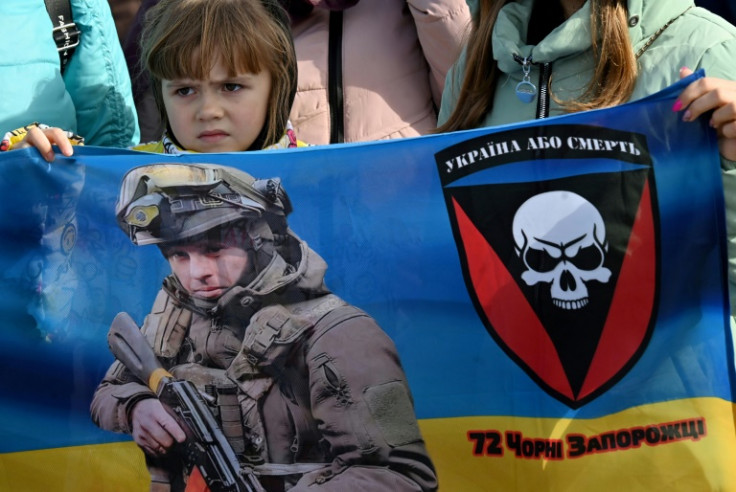'Where Are They?': Angry Relatives Rally In Kyiv Over Missing Soldiers

A group of relatives of soldiers missing in action or taken prisoner protested in Kyiv Monday, accusing President Volodymyr Zelensky and the military leadership of failing to help them.
As the war enters its 600th day with little progress on the counteroffensive, a group of around 200 protesters, almost all women, rallied on Independence Square in central Kyiv.
They then marched to a military roadblock near Zelensky's office, demanding an audience with the president.
"Zelensky! Zelensky!" they chanted, several in tears and shouting angry accusations at soldiers and police guarding the checkpoint.
"You are taking our guys away to the slaughter," shouted one woman.
"Where are they? Bring us back our children!" shouted another. "How long do we have to wait for our children?"
Protesters told AFP of months or over a year of uncertainty over the fate of their relatives.
They complained military commanders gave them little information and even refused to take their calls.
Women named numerous units, mainly fighting in Donbas. They said they would rather know for sure, even if their loved ones have been killed.
Zelensky did not appear but a presidential administration representative came out and collected their letters.
"They've treated us awfully," said one protester, Yulia Chernobyl.
"We understand perfectly that the president won't look at them (the letters), they simply won't give them to him."
Her father Andriy went missing in Bakhmut in eastern Ukraine, fighting with the 120th territorial defence brigade.
"Now I don't know where my dad is. I've been searching for him for half a year without any result," said Chernobyl, a medic.
Anna Matyazh, whose husband was declared missing more than 18 months ago while fighting in the 54th brigade in the Donbas battalion, said: "The commanders just send them out to their deaths."
Official investigations by brigades into the men's fates "are unfortunately carried out carelessly," she claimed, without bothering to question witnesses, and can last 5 to 7 months.
"We want (the authorities) to hear us, for them to start effective action," she said.
Matyazh hopes her husband was taken prisoner, as other men fighting with him were.
Russia has not provided full lists of prisoners-of-war nor full access to detention facilities.
"We can't stand it any longer," said Inesa Sukhina from Poltava region, whose boyfriend Yuriy from the 81st brigade was declared missing 10 months ago
"The worst thing is not knowing."
Her boyfriend was declared missing along with a group of fellow fighters in Bilogorivka, Lugansk region.
She said she understands there was heavy fighting and it may have been impossible to retrieve bodies from the battlefield but believes there would have been witnesses in any case.
Families ripped apart by the war include that of 16-year-old Nadiya Primak from Zaporizhzhia.
She held a poster showing her father, who went missing in the Donetsk region and her 28-year-old brother, a marine in the 36th brigade, who has been held prisoner for 18 months.
The family know her brother is a prisoner-of-war because they saw him in Russian video footage.
"We've come today because we want to know where my dad is, where my brother is... Our authorities are silent about them -- why are they silent?" said the schoolgirl who wore her hair in plaits.
"We want to hear the truth. We want to hear it all like it is."
"We want the truth and for the commanders to speak to us, the relatives," her mother Vira added.
"The commanders turn off their phones so we can't call them."
© Copyright AFP {{Year}}. All rights reserved.





















